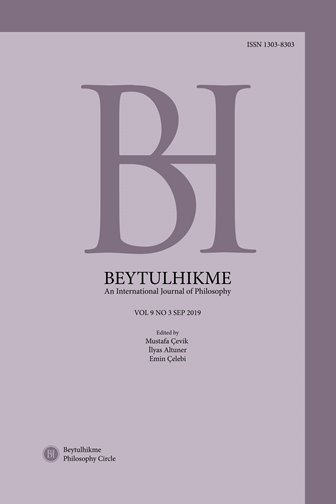Author :
Abstract
Aristoteles’e göre insan nefsindeki edilgin akıl bilkuvve hâlde bulunup etkin sebep konumunda olan bir akıl sayesinde fiiliyata geçer. Bu akıl yani faal akıl fiiliyata karşılık gelip sürekli akleder; müstakil, ölümsüz ve ezelî-ebedîdir. Bu yönüyle nefsin dışında bir akıl gibi görünür. Ne var ki Aristoteles konuya dair açıkça bir belirlemede bulunmaz. Öte yandan faal aklın nefsin dışında olduğu kabul edildiği takdirde neye tekabül ettiği sorusuyla karşılaşılır. Aristoteles’in açıklamaları çerçevesinde soruyu kesin bir biçimde yanıtlamak mümkün değildir. Kindî de Aristoteles gibi nefste bilkuvve bulunan aklın başka bir akıl yani sürekli bilfiil olan akıl vasıtasıyla fiil alanına çıktığını belirtir ve fiil alanındaki aklı “müstefad akıl” olarak adlandırır. Öte yandan Kindî akıllara beyanî/zahir akıl şeklinde bir dördüncüsünü ekler, bu akıl nefste olan bilginin ortaya konmasına karşılık gelir. Kindî sürekli bilfiil olan aklı tümeller biçiminde ele alsa da konuyla ilgili olarak kapsamlı izahatta bulunmaz. Dolayısıyla Aristoteles’teki gibi bir belirsizlik durumu mevcudiyetini korur.
Keywords
Abstract
To Aristotle, the passive intellect in the human soul is potential, and it becomes actual through an intellect that is an active cause. This intellect, that is, the active intellect corresponds to actuality and thinks perpetually; is separate, immortal, and eternal. From this aspect, it seems as an intellect external to the soul. However, Aristotle does not express clearly this matter. On the other hand, when it is assumed that the active intellect is external to the soul then the question regarding what it corresponds arises. It is not possible to answer the question precisely within the framework of Aristotle’s explanations. As Aristotle does, Al-Kindi also points out that the intellect which is found potentially in the soul comes into actuality through another intellect, that is, the perpetually actual intellect; thus he calls the intellect in the actuality as “the acquired intellect”. However, Al-Kindi adds to the intellects another sort called “the emergent/appearing intellect”, and this intellect corresponds to the manifestation of the knowledge in the soul. Although Al-Kindi regards the intellect that is perpetually actual as universals, he does not give comprehensive explanations about his arguments. A case of uncertainty like the one in Aristotle, consequently, preserves its existence. Thus the article defends that Al-Kindi's account also falls short of providing an explanation that avoids the problems which emerge in the Aristotelian account.
Keywords
- Alexander of Aphrodisias (1990). The De Intellectu. Two Greek Aristotelian Com- mentators On The Intellect. (Trans. F. M. Schroeder & R. B. Todd). Toronto: Pontifical Institute of Mediaeval Studies, 42-58.
- Aristoteles (2019). Ruh Üzerine. (Çev. Ö. Aygün & Y. G. Sev). İstanbul: Pinhan Yayıncılık.
- Aristoteles (1996). Metafizik. (Çev. A. Arslan). İstanbul: Sosyal Yayınlar.
- Aristotle (1960). Metaphysica. (Trans. W. D. Ross). The Works of Aristotle, vol. VIII. (Ed. W. D. Ross). London: Oxford University Press.
- Aristotle (1958). De Generatione Animalium. (Trans. A. Platt). The Works of Aris- totle, vol. V. (Ed. J. A. Smith & W. D. Ross). London: Oxford University Press, 715a 1-789b 21.
- Arkan, A. (2004). Kindî ve İbn Rüşd’de İnsan Tasavvuru. İslâm Araştırmaları Dergisi, 12, 27-54.
- Bolay, S. H. (1989). Akıl. Türkiye Diyanet Vakfı İslâm Ansiklopedisi, c. 2. 238-242.
- Davidson, H. A. (1992). Alfarabi, Avicenna, And Averroes, On Intellect. New York & Oxford: Oxford University Press.
- De Boer, T. J. (2004). İslâm’da Felsefe Tarihi. (Çev. Y. Kutluay). İstanbul: Anka Yayınları.
- El-Fârâbî, E. N. (2004). İdeal Devlet El-Medînetü’l-Fâzıla. (Çev. A. Arslan). Ankara: Vadi Yayınları.
- Guthrie, W. K. C. (1983). A History of Greek Philosophy Volume VI Aristotle An Encounter. Cambridge: Cambridge University Press.
- İbn Rüşd (2007). Psikoloji Şerhi, Telhîsu Kitâbi’n-Nefs. (Çev. A. Arkan). İstanbul: Litera Yayıncılık.
- İbn Sînâ (2005). Kitâbu’ş-Şifâ Metafizik II. (Çev. E. Demirli & Ö. Türker). İstan- bul: Litera Yayıncılık.
- Kaya, M. (2014). Kindî ve Felsefesi. Kindî. Felsefî Risâleler. (Çev. M. Kaya). İstan- bul: Klasik Yayınları, 17-104.
- Kindî (2014b). Kindî’nin Mutasım-Billâh’a İlk Felsefe Üzerine Yazdığı Kitap. Felsefî Risâleler. (Çev. M. Kaya). İstanbul: Klasik Yayınları. 126-177.
- Kindî (2014c). Kindî’nin Uyku ve Rüyanın Mâhiyeti Hakkındaki Risâlesi. Felsefî Risâleler. (Çev. M. Kaya). İstanbul: Klasik Yayınları. 253-263.
- Kindî (2014d). Kindî’nin Tarifler Üzerine Risâlesi. Felsefî Risâleler. (Çev. M. Kaya). İstanbul: Klasik Yayınları. 178-189.
- Kindî (2014e). Kindî’nin Gerçek, İlk ve Tam Etkinle Mecâzî Olan Eksik Etkin Üzerine Risâlesi. Felsefî Risâleler. (Çev. M. Kaya). İstanbul: Klasik Yayınları. 190-191.
- Kindî (2014f). Ebû Yûsuf Yakûb b. İshâk el-Kindî’nin Aristo, Eflâtun ve Diğer Filozofların Kitaplarından Özetlediği Nefis Üzerine Risâlesi. Felsefî Risâleler. (Çev. M. Kaya). İstanbul: Klasik Yayınları. 244-250.
- Kindî (2014g). Kindî’nin Aristoteles’in Kitaplarının Sayısı ve Felsefe Tahsilinde Buna Duyulan İhtiyaç Konusunda Risâlesi. Felsefî Risâleler. (Çev. M. Kaya). İstanbul: Klasik Yayınları. 268-285.
- Liddell, H. G. & Scott, R. (1996). A Greek-English Lexion. Oxford: Oxford Univer- sity Press.
- Peters, F. E. (2004). Antik Yunan Felsefesi Terimleri Sözlüğü. (Çev. H. Hünler). İstanbul: Paradigma Yayıncılık.
- Ross, W. D. (2014). Aristoteles. (Çev. A. Arslan). İstanbul: Kabalcı Yayıncılık.
- Sarıtaş, K. (2012). Kindî'nin Akıl Teorisinin Kaynağı Sorunu Üzerine. Dini Araş- tırmalar, 15 (40), 90-111.
- Taylan, N. (1985). Anahatlarıyla İslâm Felsefesi, Kaynakları - Temsilcileri Tesirleri. İstanbul: Ensar Neşriyat.
- Tricot, J. (2001). Dipnotlar. Aristoteles. Ruh Üzerine. (Çev. Z. Özcan). İstanbul: Alfa Yayınları.
- Uysal, E. (2004), Kindî ve Fârâbî’de Akıl ve Nefs Kavramlarının Ahlâkî İçeriği. Uludağ Üniversitesi İlâhiyat Fakültesi Dergisi, 13 (2), 141-156.





